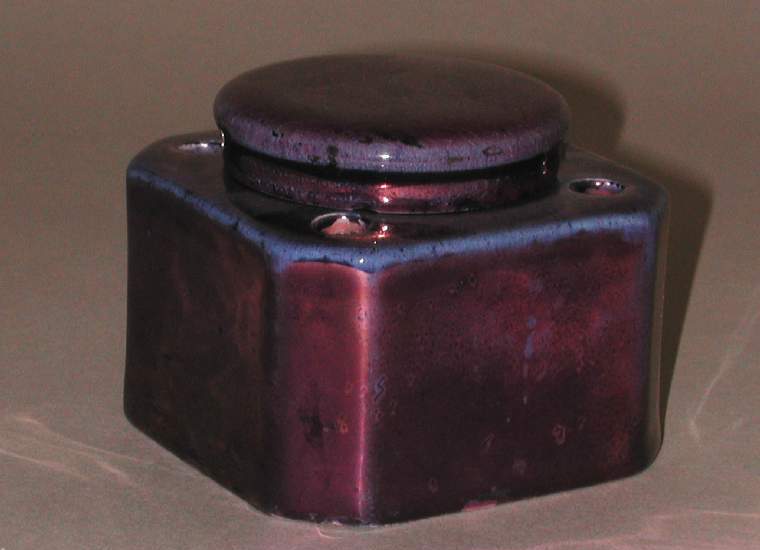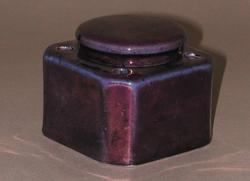Current Location: In storage
Titles
Lustreware inkstand
Maker(s)
Designer:
Moorcroft, William
Pottery:
Moorcroft Pottery
Entities
Categories
Description
Earthenware inkstand and cover, decorated with under glaze blue and with pinkish lustre glaze.
Square inkstand, with cut off corners and four holes at the corners for pens. The lid is circular, covering a round neck within which sits a conical ink well. The colour is a pinkish, purple lustre over a deep blue ground, which shows through at the edges; it covers the whole of the surface except the inside of the ink well, which has the same glaze but not the blue. The underside is recessed and of both inkstand and cover is decorated.
Notes
History note: Army & Navy Stores, London, bought for four shillings and nine-pence on 13 Nov 13, 1918, by Dr Glaisher, Trinity College, Cambridge
Legal notes
Dr. J.W.L. Glaisher Bequest, 1928
Measurements and weight
Height: 6.6 cm
Height: 2.625 in
Acquisition and important dates
Method of acquisition: Bequeathed
(1928)
by
Glaisher, J. W. L., Dr
Dating
20th Century, Early
Circa
1913
CE
-
1918
CE
Note
William Moorcroft (1872-1945), the son of a potteries artist and designer, trained at Burslem School of Art and in London and Paris. From c.1897-1913 he was chief designer for James Macintyre & Co.’s new Art Pottery department, in Burslem. His designs were sold through Tiffany of New York, Liberty of London and other prestigious stores. In 1913, Macintyre’s reverted to industrial wares and some thirty workers transferred to a newly established Moorcroft Pottery, in Sandbach Road, Cobridge, set up with financial support from Liberty’s; both businesses continue today. Moorcroft designed both the shape and decoration of his pottery, each complementing the other; he experimented widely with glazes and decorating processes, and produced plain lustrewares from c.1912-1922, when his interest moved on to flambé glazes. Lustre pieces are rarely signed. Dr Glaisher notes that 'there was a good deal of this ware having the same lustre' when he bought this inkstand at a London store, c.1922, and he 'bought this example as a small and convenient specimen'.
School or Style
Art Pottery
People, subjects and objects depicted
Components of the work
Decoration
composed of
lustre
underglaze colours
Inkstand
Depth / Width 7.5 cm
Depth / Width 2.875 in
Lid
Diameter 5.5 cm
Diameter 2.125 in
Materials used in production
Earthenware
Techniques used in production
Hand building
: Earthenware, in two parts, painted underglaze in blue and covered in pinkish lustre.
Painting underglaze
Lustring
Inscription or legends present
Inscription present: (label described by Dr Glaisher, now lost)
- Text: W.Moorcroft. Hand made pottery No 876
- Location: Underside of base
- Type: Label
References and bibliographic entries
Identification numbers
Accession number: C.45 & A-1928
Primary reference Number: 75137
Old object number: 428
Stable URI
Audit data
Created: Saturday 6 August 2011
Updated: Tuesday 30 April 2024
Last processed: Tuesday 13 May 2025
Associated departments & institutions
Owner or interested party:
The Fitzwilliam Museum
Associated department:
Applied Arts





